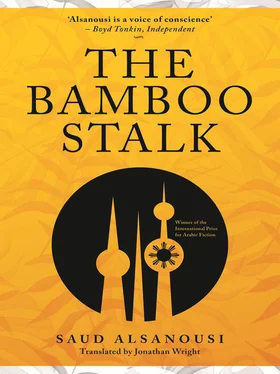In the other line, a young Filipino said to me, ‘You were standing in the wrong place. That line’s for Kuwaitis and people from the other Gulf states.’
I nodded gratefully and muttered to myself, ‘He turned me away when he saw my face, even before he had a chance to see my passport.’
I crossed the yellow line on the floor and presented my blue Kuwaiti passport to the officer. He took it, leafed though the pages and examined my face. ‘Sorry about my colleague,’ he said with a smile. ‘I could stamp your passport here, but would you mind going back to my colleague?’ I looked over at the scowling officer and shook my head. ‘Please, you have a right to stand there, even if it does take you longer,’ he said. He handed my passport back without stamping it and said with a smile, ‘Welcome to your country, but not through the gate for foreigners.’
I crossed the yellow line a third time and submitted my passport to the angry officer. The fact that my passport was blue made his face turn red. Without checking my face or making any comment, he stamped the passport. I turned to his colleague with the smile as soon as I was through the gate. He was looking at me, still smiling. He gave me a wink and a thumbs-up sign, then went back to work stamping foreigners’ passports, letting people into the country in the proper lane.
The shops, restaurants and cafés at the airport were closed. The lights were off and the chairs were upside down on the tables. It was really depressing. I turned and looked at the faces of the various people who had come to meet arriving passengers. If the faces weren’t sad, they were blank and silent. If they weren’t in a good mood, what made them come out to meet people coming back from their travels , I wondered.
Ghassan was standing in the crowd. I wouldn’t have recognised him if he hadn’t been holding a sign with my Arabic name, or my Filipino number, on it — Isa. He was wearing a dark Arab thobe and nothing on his head. His moustache, like his hair, was silver, or rather a mixture of black and white, which made it difficult to guess how old he was. His eyes were sad in a way I hadn’t seen before. If someone were ever to ask me what sadness looked like, I would say, ‘Ghassan’s face.’
It was cold outside, not as my mother had described it in our conversations about Kuwait. When we came out of the airport I took a close look at the streets. Beautiful trees and flowers were planted on the verges and the roundabouts but the scenery grew less and less green as we drove away from the airport, until in the end it was mostly yellow. On that day there were flags at half-mast along the road too.
‘The way we put up flags is different from your way,’ I said to Ghassan. ‘In the Philippines we put the flag at the top of the mast.’
Ghassan nodded and in English with a strange accent he replied, ‘In Kuwait too, and everywhere else, but the country’s in mourning.’
‘Mourning?’ I asked him, expecting an explanation.
‘The flags are at half mast because the Emir died this morning,’ he said.
2
Ghassan told me he was supposed to take me straight from the airport to Grandmother’s house, but the country was in mourning, people were upset and, most importantly, it wasn’t clear how Grandmother felt about me coming back. What would she think about me arriving just as the Emir had died? Hadn’t my mother and I caused enough trouble in the past? My mother had arrived at the time of the attack on the Emir’s motorcade in the mid-1980s, I was born at the time of the plane hijacking, and we left Kuwait when the passengers were released. The fact that I had arrived at just that moment confirmed my grandmother’s belief in the curse of Josephine, Ghassan said. So my meeting with Grandmother had been postponed for a month.
Just because I took a liking to Ghassan and trusted him didn’t mean I took a liking to the place where he lived. It was a small flat in the district of Jabriya, the same name as the plane that was hijacked years earlier with Ghassan and Walid on board. Both took their name from Jabir, the first name of the Emir that people were mourning on the day I arrived.
We didn’t go out of the flat for the first three days. Ghassan didn’t need to go to work because government offices and most companies and other offices were closed for the period of mourning. Ghassan was busy watching television. He would speak to me a little, then go back to watching and occasionally crying. He wiped away his tears with the back of his hand. The television showed the Emir carried on people’s shoulders, wrapped in the Kuwaiti flag, and thousands of people around him in a cemetery in the desert. The presenter sounded sad but I couldn’t understand what he was saying. He would stop his commentary whenever he was about to cry. I said nothing. Ghassan seemed to be performing some religious rite and I didn’t want to interrupt him. On television the camera switched to another place that was packed with women with black tattoo marks. They were weeping bitterly. There were girls carrying pictures of the late Emir and old women crying on the pavement. Amazingly some of them had come in wheelchairs.
I was surprised at how the sadness affected everything. Seeing sad faces is only to be expected on some occasions, but for everything to be sad — the streets, the houses, the land, the sky — all at the death of one person, seemed a little too much.
Sadness is something colourless and invisible that a person projects and that then infects everything around them. The effect is evident on everything they touch, even if the sadness itself remains invisible. That’s how Kuwait was in the first days after I arrived. People were projecting their grief; the ground, the sky and the air, everything soaked it up.
The television went on broadcasting shots of the late Emir at various ceremonies, with the voice of a man singing unaccompanied. Or perhaps he was praying or reading the Qur’an. I wasn’t sure.
If Ghassan hadn’t told me that the man on the screen was the late Emir I would have thought he was a major religious figure. His simplicity, his humility and the way people jostled to be near him suggested that people had an unusually warm relationship with him. There were shots of him stepping out of a black Mercedes in a black cloak and shaking hands with old men who looked overjoyed to see him. In other footage, which Ghassan said dated from when he came back to Kuwait after the liberation from Iraq, he was in a brown cloak on the steps of a plane, with his hands raised in the same way as at Friday prayers. He kissed the ground as soon as he set foot on Kuwaiti soil again. The black band that held his white headdress in place fell off when he bent down. He stood up, put it back on his head and then kissed a red book that some men presented to him. In another shot he was on a red carpet greeting men in military uniform, and in one he was without a gown, sitting with many men around a meal laid out on the floor. Finally he appeared on a flat piece of desert turning his head right and then left, with a line of men behind him following his lead in communal prayers. Far from the scenes on television, in the sitting room where I was sitting, Ghassan was in another world.
* * *
‘Sir, the first time you called you told my mother there was a reason why you couldn’t go abroad,’ I said to Ghassan a few days after I arrived.
‘Isa! Ghassan isn’t a hard name to say,’ he replied disapprovingly. ‘Why do you insist on calling me “sir”?’ He paused a while, then continued, ‘Yes, I can’t go abroad, because I’m not Kuwaiti.’
In everything I had heard about Ghassan from my mother, she had never told me he wasn’t Kuwaiti. Besides, I couldn’t see what not being Kuwaiti had to do with not being able to go abroad.
Читать дальше












